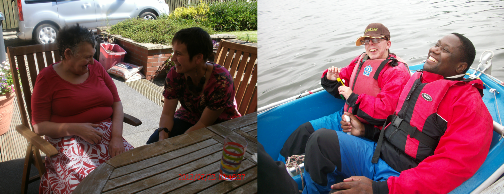
Person Centred support – the secrets revealed…
Person Centred Support, everyone says they’re doing it but we know that’s not actually the case, because we wouldn’t exist if everything was working well!
As part of our Stay Up Late campaigning work we thought it would be helpful if we could interview the people who know how to get it right and find out what their secrets are. Those people who know how to truly provide person centred support.
In November last year we travelled up to Getta Life in Coventry as we’d been tipped off that they were doing utterly fantastic work in supporting people to have great lives – not just great lives, but also ordinary lives.
Getta Life is a small provider of support to 24 people with profound and multiple learning disabilities living their own homes in Coventry (all have high support needs). They’re registered with the Care Quality Commission and are set up as a not-for-profits organisation contracted to provide support by Coventry and Warwickshire Councils.
Through this discussion we discovered their secret to providing truly person centred support and the answer is incredibly simple, but for some providers will be a very challenging and radical idea.
Also a big thank you to Tom Jolley who made this interview possible with his great questioning skills.

Sense of purpose
The first thing you notice when you walk in their training room is the great big framed photos all round the walls of every person they support, and Julie (one of the Directors) can tell you, with clear love and enthusiasm, about each individual they support. You also won’t hear them use any terms like ‘service user’ or ‘client’ – they are ‘the people we support.’
It’s the same feeling when you walk in to their admin office, there’s big photos of everyone in there too, to remind everyone the purpose of why they work there (which reminds me of my post about the purpose of people who work in any organisation – ‘What’s the purpose of a communications department?’).
There’s also an open door policy in the office where anyone they support is welcome to pop in for a cup of tea and a chat.
It’s all about relationships
‘Person Centred’ has become one of those terms which is overused and rolls of the tongues of directors of support providers but we know that many thousands of people aren’t getting support that puts them at the centre. Getta Life have an approach which does feel totally person centred and they achieve this in a number of ways:
- They’re careful to recruit the right kind of people.
- They match each person with three support workers, who work one to one, and typically work from 10am to 10am, meaning they are there to support whatever activities they’ve got planned. This may mean staying up late at a concert but also may mean an early night too. This means there are no rotas.
The only exception to this is one woman who has a fairly naughty dog (Buster) who needs walking and so the hand-overs revolve around this need!
Sue and Julie realise that there’s an optimum size for their organisation, which they’ve achieved. They support 24 people, have 90 staff and if you count up family members that’s around 150 people and there’s plenty of research to show that any organisation shouldn’t be bigger than this otherwise you don’t know each other. That’s why an army battalion is 150 soldiers and Goretex, the multi-million dollar manufacturer, restricts the size of any of its factories to no more than 200 people.
When an organisation gets too big it’s inevitable that personal relationships with all people using support, and staff and families, is going to be difficult or impossible.
This also means that Julie and Sue have mentored two staff members to form a sister organisation called Perspektive which supports 6 people. Truly inspiring stuff. They’re not trying to build an empire, just enable people to lead great lives.
Valuing their staff
This approach to being person centred also extends to the way they value their staff. There’s a very low turnover of staff and they make a particular effort to value their staff which isn’t about money. They provide a thorough training programme but also do simple things like show appreciation for individuals through writing a ‘star letter’ to reflect on a particularly great piece of support or to show recognition for great work.
The result is they’ve got happy and loyal staff who feel valued, and occasionally, when they can afford it, they pay them a bonus but it’s clear that the staff aren’t motivated by money. (Here’s another post about our views on this – ‘Support workers – valuing their roles’)
The results
Through our discussion we heard countless examples of the way their approach has transformed the lives of the people they support through patience, skill, determination and through getting to know everyone. They’re also clearly great at being ‘community connectors’.
The big secret revealed
So what’s this big, and potentially radical secret?
- They don’t have rotas.
- They have a flat management structure.
- The directors have enough time to know everyone personally and make time to go and spend time with everyone.
And for me crucially…
- They have restricted the size of their organisation to support no more than 24 people, recognising that the quality and integrity of the support they can provide will inevitably deteriorate beyond this number.
- They don’t have any systems! This for me is a devastatingly simple, yet challenging, revelation. It’s totally liberated the way they work so they serve the people they support and not any systems that have been created.
Just imagine if we could create a system of care and support that enabled us to focus 100% on the people we support and not the needs of rotas and staffing hand-overs.
What’s stopping the Getta Life approach from working elsewhere?
This is the difficult question to answer as their approach seems so sensible and straightforward but to replicate their approach would mean larger providers having to reinvent the way they were set up so as to lose the systems which restrict staff from supporting people in a free way that is truly person centred and not about preserving an established business model.
The answers seem so simple and so straightforward; staff work for as long as they need to and go to bed when the person they support goes to bed.
They also invest in the right moving and handling equipment so as to enable staff to work one to one. Julie points out that as soon as you dictate that you need 2 staff to support someone you are inevitably reducing their life opportunities so they try to avoid this wherever possible.
So the answer to supporting people to lead great lives is actually really simple but we will need to give up all the systems we’ve created and start again.
Watch the interview
We’ve made a series of short films from the visit. Here’s a short edited version of their top tips.
(We’ll post up more videos from this interview soon).
I sometimes like to finish my posts with a tune to help you ponder over what we’ve written and I was thinking that ‘Rip it up and start again’ by Orange Juice would have been appropriate. However, seeing as though we were talking about how Getta Life support people with learning disabilities in Coventry (the home of Two Tone) to Stay Up Late it seemed only appropriate to pick this…
We’d love to hear more stories like this. If you are a support provider or personal assistant who know the secret to great support please get in touch. And if you have a learning disability and want to tell us about your experiences of great support please get in touch.
[button font_size=”20″ color=”#c8232b” text_color=”#ffffff” icon=”envelope-o” url=”https://stayuplate.org/contact/” width=”” target=”_blank”]Drop us a line[/button]

